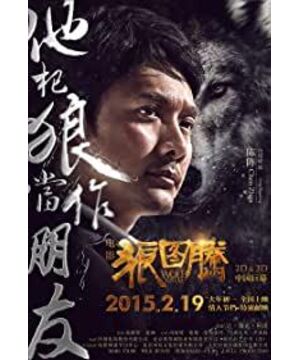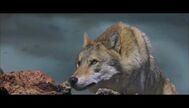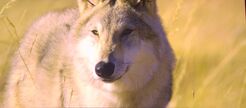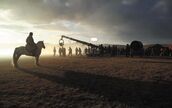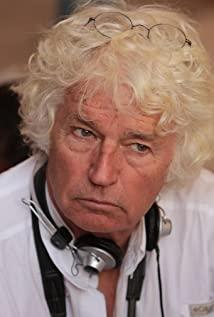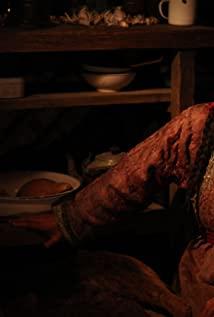Let's start with the conclusion: "Wolf Totem" is the most evil movie I have ever seen, and there is no one. To say it is evil is not to deny the beauty of the "Wolf Totem" picture, the exquisite editing, or the grandeur of the scene. This is not what this answer wants to write. There have been many film critics explaining "Wolf Totem" from these perspectives. I don't have the relevant professional knowledge and I don't make any trouble. The evil of "Wolf Totem" lies in its ideological content and a dangerous value expressed in its logic. This involves many sensitive issues, such as ridicule and satire about China's current ethnic policy, and the inverted black and white distortion and smear of the main ethnic group in China. After the movie ended, I couldn't calm down for a long time. The SARFT should ban films like "Wolf Totem", and what should be vigilant is the logic conveyed by "Wolf Totem". Because this logic can be copied in batches and applied to multiple ethnic minorities in the border region.
Many friends regard "Wolf Totem" as a humanistic and environmentally friendly film. Because of their ignorance and conceit, the foreign households who flooded into the grassland eliminated the wolves occupying an important position in the grassland ecological chain, causing the collapse of the grassland ecological environment. At the end of the film, Chen Zhen left the grassland because "the grassland is not what it used to be, and there are no wolves." The movie shows a bleak scene, it seems to warn people today to pay attention to protecting the ecological environment and maintaining the balance of the ecological environment! Can not be insatiable and demandless. The conflict between nature and human beings is an angle to analyze "Wolf Totem", but it is not the main angle. The ambition of "Wolf Totem" does not lie in this. Because in "Wolf Totem", the prairie wolf, the captive sheep, and the main characters-Chen Zhen, Bao Shungui, Bilig, etc., are no longer the image itself, but the symbol.
The wolf is the skeleton of "Wolf Totem". There is a scene that appears repeatedly in the movie: a flagpole is erected in front of the yurt, and a pair of wolf skins hung on the flagpole, flying in the wind, as if resurrected. Although Mongolian herders are digging out wolf dens to kill wolf pups, this was done by "supervisor's instructions" and was not what they were willing to do; here is a sentence that "violates the traditions of the grassland and makes Old Man Billig frown". They were all instructions from the superiors, and none of them were done willingly by the herdsmen. Before throwing the little wolf into the air and falling to death on the stone, the herdsmen prayed to Tengger, hoping that he would take the little wolf's soul. Herdsmen’s feelings for wolves are not so much hatred as they are awe. After Chen Zhen integrated into the prairie life, he once lay on a mountain beam with Old Man Billige to observe the wolves hunting yellow sheep. Bilig said, “We Mongols learned from wolves in fighting. Genghis Khan’s general Mu Huali drove the golden cavalry into the snow nest, just like a pack of wolves drove yellow sheep into the Daxue Lake.” Chen Zhen was raised in captivity. After the little wolf was learned by Billig, his Abba flew into a rage. The old man believed that Chen Zhen's feeding of wolf meat was depriving the wolf of freedom; the wolf was the Mongolian god and totem, and Chen Zhen's behavior was an insult to the Mongolian god. To sum up, I believe that the prairie wolf symbolizes the spirit of freedom of the Mongolian people and is the core of Mongolian civilization; thinking of the wolf, the Mongolians recall the golden age when Genghis Khan flogged the world and swept across Europe and Asia. Seeing the symbolic meaning of wolves, one can understand the main plot in the movie-the conflict between the wolf pack and the man who destroys the wolf pack, not just the conflict between humans and animals.
In the documentary "Wolf Totem", the director Jean Jacques Arnault explained his view of the film and what the film said: "Most of my films are about young people wanting to change their stories, because The confrontation between young people and civilization"; "It is a story of love: about a young man falling in love with a piece of land, falling in love with the people on this piece of land, falling in love with the culture of this piece of land, and then he realized that Mongolian culture is Replicating the social culture of wolves, he decided to start studying wolves and captured a wolf, and then fell in love with this wolf." Here is a tracing of Chen Zhen’s life, how Chen Zhen changed himself and fell in love with this land, people, and culture. It is very interesting and necessary.
Chen Zhen is an educated youth from Beijing who came to the Inner Mongolia grassland to jump in. I believe he was deeply involved in the political movement at the time before leaving Beijing, and experienced disillusionment after the political movement ebbed. The film does not focus much on Chen Zhen’s life before coming to the grassland. Only through his words, “Finally left the chaotic capital; other educated youths are crying, but I am laughing, because it’s better to go anywhere than stay in Beijing. Good." Compared with the educated youth Link, Chen Zhen loves to read very much. He has a wooden box full of books for him. He is on horseback, in a yurt, and amidst shepherd. I often read with a book. The general public will have illusions about people who like to read. They think that they are knowledgeable and think deeply, so that what they say will be authoritative, and they are not nonsense. Under such a hint, Chen Zhen faced a dry grassland and expressed a shocking point of view: "The dry grassland in front of me has a history of 6000 years. I don't understand why we Han people have been building the Great Wall; Han people are like sheep. The same." This is the only time in the film that Chen Zhen confided his new view of history through the baptism of prairie life. I think this is the key to understanding the ideological connotation of this film.
Regardless of whether there is such a long history of civilization under the steppe. 6000 is a very interesting number. Yes, it is exactly 1,000 years longer than the official Chinese civilization. There is not a word in the film that is casually said. The extra 1,000 years vaguely express a view in Jiang Rong's "Wolf Totem" novel, that is, the "dragon totem" believed by the Chinese nation comes from the "wolf totem". The ancestors of Chinese civilization were not the Three Emperors and Five Emperors, nor the Wenwu of Yao, Shun, Yu, Tang and Zhou, but the nomads who wore leather robes and rode horses in the bitter cold place outside the Great Wall. So far, there is no archaeological discovery and documentary record that can be used as evidence for Jiang Rong's viewpoint; this viewpoint is the starting point of the following argument, and it is also the source of his shameful view of history.
Let us continue to analyze this passage of Chen Zhen. On the one hand, Chen Zhen compared the Han to a flock of sheep, but at the same time did not understand why the Han had to build the Great Wall. We know that the sheep grazing on the grassland, in order to avoid being hunted by wolves, must be gathered into the pen after dark. The Great Wall is a military barrier to protect the Han people from aggression by the herdsmen in the lower reaches of the south. If the Han people are really the sheep, then the Great Wall is the sheep pen. Sheep that do not enter the pen in the dark will inevitably be hunted down by wolves; why should the Han people who do not build the Great Wall defend against the invasion of nomads? Chen Zhen’s incomprehension also implied a horrifying view of history, that is, it is justified for the nomads to go south to plunder the farming peoples, because it is justified for the wolf to eat the sheep. The argument that the wolf eats the sheep is justified many times in the movie, for example, when herdsmen went to the Daxue Lake to pick up the yellow sheep buried by the wolf. It is only natural for wolves to eat sheep, so it is very strange that sheep resist the encroachment and devouring of wolves. So, all anti-aggression wars in the history of China were unnecessary; after foreign enemies invaded, they were caught with their hands. Why bother wasting lives and blood and making futile resistance? According to Chen Zhen's idea, there was no need to resist the Japanese invaders in 1937, and it would not be possible to win anyway. If the sheep in the film are not protected by the sheepfold or cheered by humans, they are weak and weak and can be killed wantonly. In the face of the invasion of foreign enemies, were the Hans in history weak and powerless to be killed indiscriminately? It is undeniable that in certain historical stages, foreign invasions caused great pain to China, such as the Yongjia Rebellion, such as the Shame of Jingkang, such as Lin'an in 1276, and Shanhaiguan in 1644. But today, the people on this land are still speaking Chinese, writing Chinese characters, reading the first four histories and Zizhi Tongjian, still able to sit up at midnight, sleepless at night, cheering for the heroes’ deeds or cheering, or tears of tears. Orbital. why? Because although China has been invaded time after time and broken down time and time again, there are always heroes struggling to survive the crisis and finally recover. Dignity and territory are all shot out. Every inch of the river and mountains under our feet is soaked with heroic blood and unyielding will. The Chinese civilization has the richest military experience in the world. There is no one; how can such a nation that has spent thousands of years and has grown stronger today be a sheep? The trash bin of history is full of dead civilizations and great nations; the most famous one is Rome. It is hard to imagine that such a movie that discredited and vilified the main nation could be shown in any other big country; but it happened to be released nationwide on the first day of the Year of the Goat. The chaotic mind is filled with colorful seeds, and it is not strange what happens now.
My view of "Chen Zhen's change" is that he has successfully completed the perfect transformation from an educated youth who is nothing and disillusioned to a traitor who is charismatic and tender. Chen Zhen on the grassland took off the military uniform (changing costumes) he wore in Beijing, and called the old man Billige Abba (changing ancestor), thinking that "we Hans" are sheep and wolves eat sheep. He had an unsuccessful love with Gasmail, and he did an experiment to raise a little wolf cub and was bitten back (this is the climax of the movie, but also the most vicious irony); unfortunately, because “the grassland destroyed the wolves and no Gass Mai is married to someone he doesn't love," Chen Zhen still returned to Beijing, where he had lived a "completely meaningless life". There are a few details that friends can pay attention to. Link, who jumped in the grassland with Chen Zhen, has never called Bilig "Abba." The two-hour movie was full of Chen Zhen’s love for the grassland, Bilig, his love for Gasmaid, and his love for the little wolf cub; but he didn’t have the slightest thoughts and concerns left in the chaos. Parents in the capital. The only time the movie mentions Chen Zhen’s parents is when Link treats Chen Zhen meticulously taking care of the little wolf pup and feeding him meat because he can’t sleep. Eat." Chen Zhen has indeed changed completely, but friends watching movies, do you want to experience such a change?
The other main character of "Wolf Totem"-the field director Bao Shungui, is a mirror image of Chen Zhen. If Chen Zhen has completely abandoned the past and is experiencing a happy new life; in comparison, although Bao Shungui has also abandoned the past, his heart is constantly struggling. It is very important to understand Bao Shungui's identity to understand his behavior. The film does not directly point out Bao Shungui’s national attributes, but in the second half of Gasmai’s mention of her fiancé, he indirectly mentioned: "My fiancé is a Mongolian from the east and he is Bao Shungui’s brother. ". Bao Shungui is a Mongolian, but he never lives in a yurt on the grassland; he lives in a settled town and wears leather coats, official uniforms, and jackets that symbolize the new era. Every time he went from the town to the ranch to give instructions and orders from his superiors, he always came in a car, and never rode a horse. Bao Shungui is a character that makes herders even more afraid of hate: afraid, because he is the director of the field, has power in his hands; hate, because almost all his actions violate the Mongolian traditions and blaspheme the Mongolian gods and gods. Totem-wolf. Bought herders from a radio to learn the location of Daxuehu, prying away all the yellow sheep, to disregarding Elder Billig’s dissuasion from not digging out the wolf cubs, skinning the wolves and angering the wolves; then they distributed the horses assigned by their superiors. The pasture under Bilig’s management caused the wolves to attack two herders in a snowy night and killed them; the migrants who allowed their farms to reclaim the grassland destroyed the Swan Lake, and the old man Bilig died of wolf-killing explosives planted by the outsiders; and finally drove the jeep to clean up the wolves. Groups of fire burned the grassland; Bao Shungui had gone too far to turn back. He knows all this. In the raging fire, he said to Chen Zhen, I know that herdsmen hate me; but being a cadre is sometimes hateful. Facing the exhausted wolf, he stood silently and took off his hat. At this moment, his heart may not be so peaceful. As a minority cadre, Bao Shungui’s power does not come from the herders under his rule, but from his "superior"; every time he hates the herders, all his actions are based on the "superior spirit." The banner was made under pressure from superiors; although Bao Shungui is a Mongolian, he is not responsible to the herdsmen. He was responsible to his superiors, which aroused the resentment of ordinary herders. Bao Shungui is indeed hateful, is it even more hateful for the superiors who gave him power to force him to act arbitrarily? A minority cadre has been portrayed as a negative model by the movie, and has been portrayed as a "spoiler" that harms the interests of the nation. The current policy of ethnic unity among minority cadres is really a lot of slander.
As stated in the previous article, Chen Zhen’s captive breeding of little wolf pups is the climax of the movie, and it is also the most vicious irony. Chen Zhen's raising wolves was an unsuccessful experiment. Because of his love and obsession with wolves, Chen Zhen wanted to try to see if wolves could be domesticated. He feeds the little wolves like taking care of his grandfather, his own meat is reluctant to eat for the wolves; he can't sleep well at night for fear that the wolf will get sick; even his parents who are far away in Beijing have forgotten. But his experiment was full of resistance at the beginning. Father Billig was very angry, because wolves should not eat the food that came, and should not be deprived of their freedom by the chain around their necks; some herders were afraid that the little wolves would attract the wolves on the grassland and hurt their livestock and children. But Chen Zhen didn't listen, and still provided the little wolf with delicious food. Until one day, the little wolf showed a fierce look and bit Chen Zhen. In shock, Chen Zhen said, "This is what the prairie wolf should be like!" The result of the unsuccessful experiment was that the little wolf was released by Gasmai and disappeared forever on the vast prairie. The logic of this story is that no matter how much meat is given to the wolf, the wolf will not become what the captives hoped. One day, one moment, a raised wolf will bite back, because this is the free nature of the wolf. Think of the symbolic meaning of the wolf in the movie, and replace the wolf with its symbol. What conclusion can be drawn? What is the highlight of the movie?
As for some details in the movie, for example, Bilig’s father persuaded Gasmai to marry a Mongolian farmer in order to keep up with the time; Gasmai rejected Chen Zhen’s proposal because of him. It was the Han who wanted to return to Beijing; Bilige was killed by explosives from outsiders (farming); Bilige pointed to Swan Lake and said to Chen Zhen: "This is Mongolia in the past ten minutes. This is the last pure piece of land. Pasture."; Gazmai's husband died because of guarding the army horses. Instead of giving the deceased a sympathy, he was almost punished; these details were extremely scary. The wolf attacked the army horse, because the man digs out the little wolf cub and beats the wolf; the man digs out the little wolf cub and beats the wolf, because the wolf attacked the sheep raised by the herdsman; the reason why the wolf attacked the sheep of the herder was because Bao Shungui took the The yellow sheep were all loaded on the truck and "stolen". The starting point of this death spiral is the theft of the yellow sheep, and the end point is the destruction of the grassland. Who caused the death spiral? Is it Bao Shungui?
The evil of "Wolf Totem" is that it hides political views and historical views that are harmful to China in a magnificent scene and beautiful picture. And the logic of the movie can be copied to any ethnic minority in the border region. Imagine one day when these ethnic minorities follow the same logic and release a movie of Totem X. Will it be a blessing or a curse for the stability and unity of this multi-ethnic country? Since the days before the arrival of the "superior" are so beautiful and free, why do we need a "superior" to rule us?
Finally, a few more words. Putting aside the various symbols and hints of the movie, it is very unlucky to show a movie in which wolves bite and devour the sheep on the first day of the Year of the Goat. I heard that the State Administration of Radio, Film and Television released the film smoothly without cutting it. The media and film critics unanimously praised after the screening: "On behalf of China, it is a good prize to win the award!" Why do I feel cold sweat. Watching "China's Good Children and Grandchildren" and "Wolf Totem" together is more helpful for understanding this movie and the cold sweat.
Appendix: Lyrics of "The Good Children and Grandchildren of China"
Grandpa is in Yishan, Grandma is
running at Kuafu (Yugong Yishan, Tiechu is ground into a needle) , Kuafu is running for 25 thousand
days (Kuafu chasing the sun) Jingwei titled Shilai and Nuwa to make up for the sky (Jingwei fills the sea, Nuwa fills up the sky)
Who lays the salary and tastes the courage and eats the bitterness (Yue Wang Goujian tries to cure the country in order to restore the country)
Chang'e dance wide sleeves Hou Yi has a strong head and feet Loyalty Dance, Houyi Shooting the Sun)
Bowing Shennong works for the happiness of the people (Shennong tastes a hundred grasses)
Cangjie broadcasts civilization and Dayu's ambitions (Cangjie made characters, Dayu governs water)
Who is it that three visits to the thatched cottage and says that my family can be cultural and martial (three visits to thatched cottage: Liu Bei)
Wen energy security world (the text can pick up a pen tranquility: Jiang Wei) can force their homes cranial (criminal-day dance dry Qi, Meng Chi solid often)
I admit defeat and death of Chinese children and grandchildren good
self-determined efficiency is not arrogant swan
on the Diocese teach I'm a mother-in-law and Meng's mother (Meng's mother moved three times, mother-in-law tattooed).
Grandpa is in Yishan. Grandma is
running in Mochu. Kuafu goes for twenty-five thousand a day.
Jingwei title Goddess stone to make the day
of who a decade Han Chuang (Yuan stone chapter "Bamboo dock Cheonggeum" the third section:. "Han Chuang snow more than a decade, the world read thousands of books")
head cantilever cone The thorn stock (suspended beam thorn stock)
Chang'e dance, wide sleeves, back yi,
head and feet bowed head and feet , Shennong seeks happiness for the people,
Cangjie broadcasts civilization, and Da Yu exhibition aspirations
, who cooks wine, talks about heroes, says my family hides the
dragon and crouching tiger (Cao Cao and Liu Bei) , the dragon, the world, and the tiger guards one side of
me how good is the Chinese children and grandchildren without her
left hand into his right hand to destroy the array number drum
dragon world hi to the happy days of the Chinese nation
View more about Wolf Totem reviews


